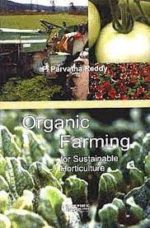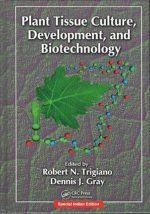-
Organic Farming for Sustainable Horticulture
KSh 15,120.00Horticulture is fast emerging as a major commercial venture, because of higher remuneration per unit area and the realization that consumption of fruits and vegetables is essential for health and nutrition. In the last one decade, export potential of horticultural crops has significantly increased attracting even multinationals into floriculture, processing and value added products. Since the horticultural produce especially fruits and vegetables are consumed afresh, consumers expect residue-free produce. In modern society where consumers are becoming increasingly health conscious and envioronmentally aware, a major market for organic foods has developed. The organic sector, in particular, has sprung back into life to become one of the most dynamic sectors in the international food market. The present book is an attempt which comprehensively deals with both principles and practices. It is divided into two parts. The first part deals with the principles of organic farming covering aspects such as enrichment of soil with organic matter, cropping systems, bio-fertilizers, weed management and pest management. The second part of the book deals with package of practice for organic farming in fruits, vegetables, ornamentals, medicinal, aromatic, plantation, spice and tuber crops. Three aspects, namely – nutrient management, weed management and pest management are dealt with separately for each crop. An entire chapter is devoted for sources of critical inputs used for organic farming which would be very much useful to the organic farmers to procure the same. This book is a practical guide to practicing organic farmers of horticulture crops. Further, it is a useful reference to policy makers, research workers and students. The material can also be used for teaching undergraduate and post-graduate courses.
-
Plant Tissue Culture Development and Biotechnology
KSh 14,840.00Under the vast umbrella of Plant Sciences resides a plethora of highly specialized fields. Botanists, agronomists, horticulturists, geneticists, and physiologists each employ a different approach to the study of plants and each for a different end goal. Yet all will find themselves in the laboratory engaging in what can broadly be termed biotechnology. Addressing a wide variety of related topics, Plant Tissue Culture, Development, and Biotechnology gives the practical and technical knowledge needed to train the next generation of plant scientists regardless of their ultimate specialization. With the detailed perspectives and hands-on training signature to the authors’ previous bestselling books, Plant Development and Biotechnology and Plant Tissue Culture Concepts and Laboratory Exercises, this book discusses relevant concepts supported by demonstrative laboratory experiments. It provides critical thinking questions, concept boxes highlighting important ideas, and procedure boxes giving precise instruction for experiments, including step-by-step procedures, such as the proper microscope use with digital photography, along with anticipated results, and a list of materials needed to perform them. Integrating traditional plant sciences with recent advances in plant tissue culture, development, and biotechnology, chapters address germplasm preservation, plant growth regulators, embryo rescue, micropropagation of roses, haploid cultures, and transformation of meristems. Going beyond the scope of a simple laboratory manual, this book also considers special topics such as copyrights, patents, legalities, trade secrets, and the business of biotechnology. Focusing on plant culture development and its applications in biotechnology across a myriad of plant science specialties, this text uses a broad range of species and practical laboratory exercises to make it useful for anyone engaged in the plant sciences.


